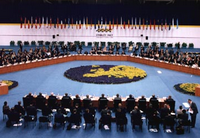SKOPJE, Macedonia -- On May 1, the European Union celebrated the fifth anniversary of its "big bang," the massive wave of enlargement in 2004 that saw it accept 10 new members -- eight former communist countries from Eastern Europe, plus Malta and Cyprus. When Romania and Bulgaria joined two and a half years later, in 2007, the EU counted 27 member states, almost half a billion people and 30 percent of the world's GDP. In the years since, the EU's enlargement policy has been considered an unequivocal success. It has brought jobs and growth to the new member states, and provided new markets for the old ones. It has spread stability and democracy, while creating an unprecedented area of free movement of people, capital, and ideas on the European mainland. For the troubled Balkans, the EU enlargement policy has also been considered the principal instrument for maintaining stability and keeping the countries of the region on course for democratic reform. If these countries have made efforts to keep nationalists at bay, it has been in large part due to the endlessly repeated promise that one day, they, too, would join the club.
Brake on EU Enlargement Dims Hope for the Balkans

